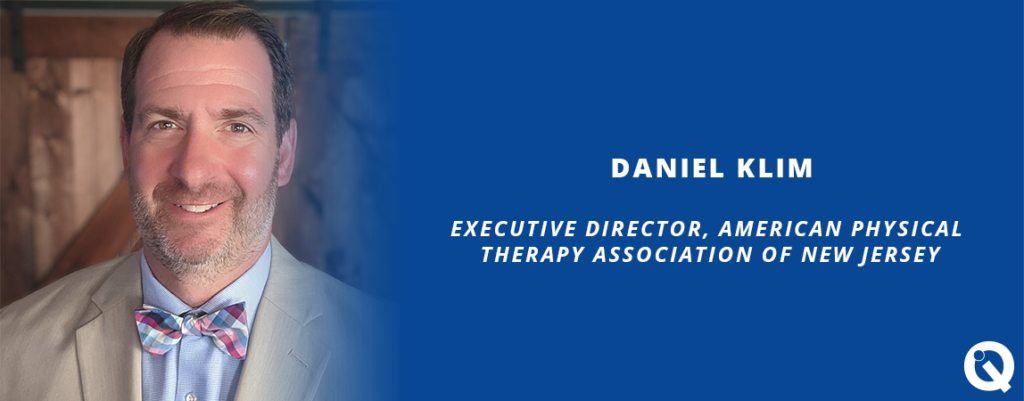Daniel Klim is Executive Director of the American Physical Therapy Association of New Jersey a member of the Quality Institute. The professional organization recently launched a mental health support program for its members. We discuss this timely and critical topic in today’s Take Five.
Your organization represents physical therapy professionals across New Jersey. How has your organization and physical therapists in general responded to the Covid-19 pandemic?
Early on, the physical therapy profession was deemed essential. Physical therapy professionals practice across settings of care. They provide care in places such as nursing homes and rehabilitation centers to schools, hospitals, in private practices and in homes. As an organization, we supported our members across these settings. Our members experienced significant mental stress. Not only was there a lack of PPE early on, but there was a lack of understanding of how these hands-on professionals were going to provide services. We developed a comprehensive resource page, complete with links to state regulatory and legislative information, financial information, PPE resources, small business grants and awards. We tried to help everyone navigate what was uncharted waters.
You also began a first of-its-kind program with Legacy Treatment Services, a member of the Quality Institute, to provide mental health and substance use disorder treatment services to your members. Can you tell us about that initiative?
This started when we shared stories from two patients who told their physical therapy experiences after being on ventilators for several weeks. Afterward, many of our physical therapy professionals responded by just breaking down from everything they had seen and heard while caring for their patients with COVID. Over the summer, we created a program with Legacy Treatment Services, which is one of the largest behavioral health organizations in New Jersey. The program has three goals. First, it provides a dedicated hotline, manned 24/7 by a licensed health care professional. If our members are feeling stressed, burned out, experiencing alcohol or drug dependency, they can connect with a licensed professional who will provide mental health treatment services.
Second, we found many physical therapy professionals experienced COVID-19 and were suffering from long COVID. Legacy created a support group so physical therapists could share their experiences. And finally, as an association, we are working with Legacy and other like-minded organizations to advocate for integrated physical and mental health services. The two go together. Why are we treating them as two separate issues? We know that mental health commonly manifests into physical pain. Integrated care will lead to better care for patients. We also encourage groups to join us and the Quality Institute in calling for eliminating regulatory and payment barriers to integrated care.
Are there opportunities for other organizations with frontline workers to receive these services?
We encourage other health professionals and organizations to create a similar model of access to mental health services for their member health care workers. They can also let their employees or members know about free mental health support programs that the especially for health care workers.
How do physical therapy professionals see the connection between pain and mental health?
Our members know that many of the ailments they treat are physical, but also have a direct correlation to mental health. As an advocacy organization, we want to bring greater awareness to the understanding that mental and physical health are connected. Leaders from APTANJ participated in the BioNJ and Quality Institute COVID-19 Workgroup, which created the recommendations for An Action Plan for a Healthier State. Specifically, our input supported the recommendation for the development of evidence-based behavioral health programs to provide mental health services to health care workers. It’s part of the Action Plan’s section on building and supporting a resilient and diverse health care workforce.
We like to add a question beyond a person’s professional life. Where might we find you on a day away from work?
I am a fan and volunteer coach so you might find me in the stands of a high school football field, or the sidelines of a soccer game. I serve as Vice Chair of the Mercer County Community College Foundation and chair of the Mercer Athletics Committee. Sports keep me pretty busy.

